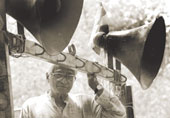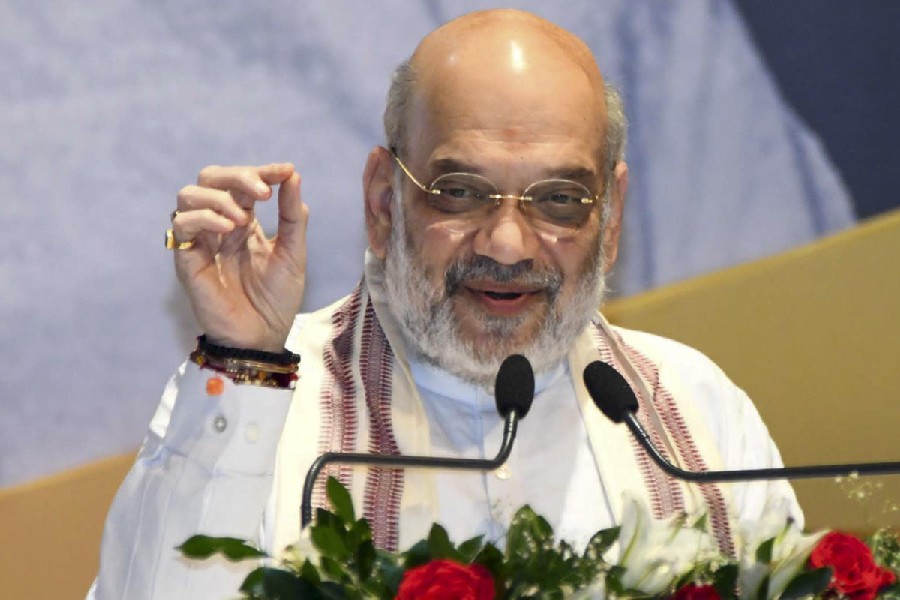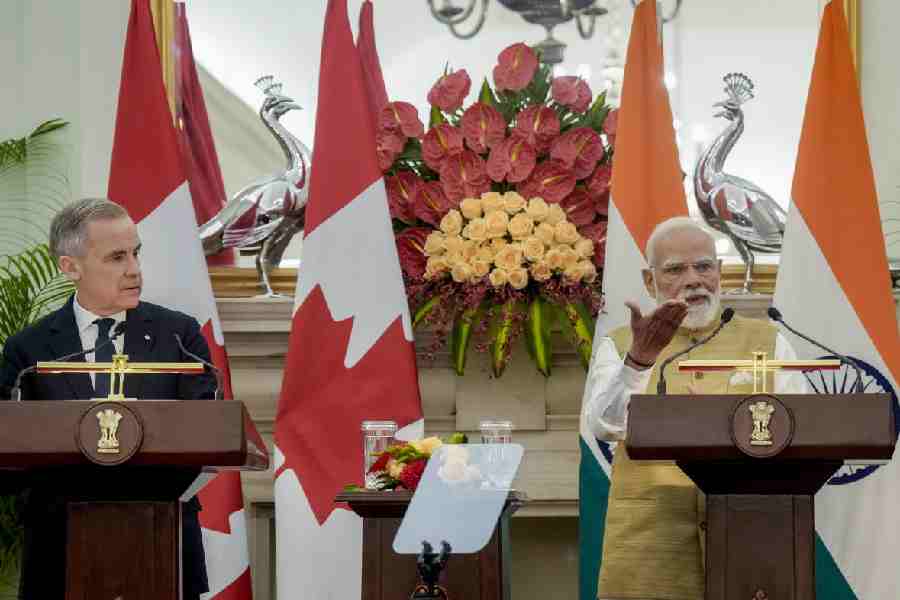|
|
There was a time when they called him Sir George the dragon slayer. The sobriquet hasn’t been used for quite a while now. These days, when they speak of him, they do so in hushed whispers. For, George Fernandes ? the man who literally brought the country to a standstill over three decades ago ? is having to deal with what could be the worst moments of his political life.
Suddenly, the former defence minister is no longer the larger-than-life politician who strode the corridors of powers. Instead, he is a man who has been drastically cut to size. One day he was a leader who had the strength to bring together advocates of disparate ideologies. Today, he has been sidelined in his own party, the Janata Dal-United (JD-U).
Last week, in an inner-party election, Fernandes was roundly defeated by his old bete noire, Sharad Yadav, who was elected party president after he won 413 votes against Fernandes’s 25. “It was a decisive victory,” says general secretary Shambhu Srivastava.
In the JD-U’s Jantar Mantar office in the heart of Delhi, they are still talking about the election and its implications. The old building, with its high ceilings and dilapidated furniture, hasn’t seen Fernandes for quite a while. But the writing on the grimy walls is clear: George is out, Sharad is in.
Ostensibly, of course, all is well. “Unity is our motto,” says Sharad Yadav. And JD-U leader and former minister Digvijay Singh says the bitterness is all over. “George Fernandes is campaigning for the party for Assembly elections. We are moving on,” he says.
But, clearly, the April 11 election has brought an inner feud out in the open. And party insiders seek to stress that the election was only an excuse; trouble had been brewing for quite a while. The honeymoon between Sharad Yadav’s JD-U and Fernandes’s Samata was over soon after the two parties merged in 2003, calling the new entity JD-U. And in what was then seen as a happy compromise, Sharad Yadav gave up the post of party president in favour of Fernandes.
Today, the same post has been taken away from him. And the litany of complaints has been growing against the convenor of the National Democratic Alliance (NDA). In a country where a politician’s age is never a factor, the fact that Fernandes is nearly 76 is being held against him. Party leaders talk about a brain operation that he recently underwent at the All India Institute of Medical Sciences. Some complain that the man who built the Samata Party from scratch is now cocooned in a fortress. “I have never seen him so out of touch with his own party men,” says a senior JD-U member.
The party split is wide open. Fernandes loyalist and general secretary Shiv Kumar believes that an effort is being made, by what he calls forces outside the party, to break it from within. “For if there is one thing that George Fernandes has never compromised on, it’s his philosophy of anti-Congressism,” he says.
And that’s not surprising, for he came into national politics not just on an anti-Congress plank but by trouncing the man then known as the King of Bombay. In 1967, Fernandes did the impossible ? he defeated Congress strongman S.K. Patil in a Lok Sabha election from Mumbai, earning the titles of a dragon slayer and a giant killer. “And he immediately became a celebrity,” recalls Surendra Mohan, veteran socialist and an ideologue of the Janata Dal.
Fernandes’s political curriculum vitae says it all. He is the man who led the 1974 railway strike ? the biggest ever in the country ? and was among those who took on the might of Indira Gandhi and her powers of Emergency in the mid-Seventies. He is the one who booted Coca-Cola out of India.
It was this fondness for all things Indian that brought him close to the Rashtriya Swayamsevak Sangh (RSS). An RSS leader points out that it was on this plank that Fernandes reached out to the Swadeshi Jagran Manch, an RSS body opposing multinational corporations in the country, and cemented his ties with the RSS and the Bharatiya Janata Party (BJP).
That was one of the reasons the RSS rooted for Fernandes during his tenure as a defence minister in the NDA government at the Centre. And Fernandes, in turn, did all that he could to keep the RSS happy. He hobnobbed with the RSS leadership, defended the government when Christian missionary Graham Staines and his two children were burnt alive in Orissa and dismissed protests over anti-Muslim riots in Gujarat.
If the JD-U leadership is to be believed, these were the factors that led to the sidelining of Fernandes in the party. “There was a growing resentment in the party because he was increasingly being identified with the BJP,” says a senior JD-U leader and former minister. “As long as the NDA was in government, it kept away from the core issues that we had problems with ? such as a temple in Ayodhya. But the RSS went back to its old agenda soon after the NDA was defeated and started talking about how the BJP had veered away from the principle of Hindutva,” he says.
The JD-U poll, held in Patna, brought the differences out in the open.
Two camps ? one, constituting the bulk of the party, led by Sharad Yadav, and the other, a smaller group under George Fernandes ? slugged it out in the open. A large section of the JD-U seemed to think that it was time Fernandes stepped down as president in favour of Yadav. “But George’s cronies kept postponing the polls,” says one of Sharad Yadav’s supporters.
Finally, after a series of postponements, the date for an election was finalised. The party’s national council had congregated in Patna before the election when Sharad Yadav suddenly got a letter from the returning officer, Anil Hegde, a Fernandes loyalist. The letter recommended that the poll be deferred for another three months.
Within hours, a bloodless coup had taken place, bringing about a change in the leadership. A special meeting was held, Hegde removed from his post, another returning officer named and a new president elected. “The returning officer had asked for a postponement because the papers were not in order,” maintains Shiv Kumar. “But what we can’t understand is why they insisted on holding an election there and then. What was the great hurry?”
The Sharad Yadav camp argues that the election was held on schedule, for the Election Commission had asked it to complete the process by May 15. The move for a postponement, it holds, was an attempt by the old guard to hold on to power.
“There is a self-seeking coterie around George Fernandes that is misguiding him,” says the senior party leader. “And it does so by keeping him away from party workers.”
There was a time when Fernandes’s gates were wide open. “Anybody could walk in at any time to have any kind of a political discussion,” says Srivastava. “He would give them time even if he was in the midst of talks with party leaders.”
For the last several months, the group claims, Fernandes has been inaccessible to the party worker ? so much so that he spent all his time at the residence of Digvijay Singh in Patna during the Bihar state Assembly elections in 2005. “He didn’t come to the party office, which was the control room for the election, but just stayed away from everybody,” says a party member.
Many in the party say they are baffled by the new Fernandes. He was, after all, the man who was known for getting along with people. “He has always been a very nice person to work with, friendly and open minded,” stresses Surendra Mohan. “And he has this art of making friends because of which he had a wide spectrum of friends, from (Shiv Sena supremo) Bal Thackeray to (the late communist leader) Indrajit Gupta.”
It was this ability that gave him stature as a trade union leader in Mumbai in the early years of his political career. Young George, who left his Mangalore home and a seminary that his father wanted him to join, started out by organising workers of hotels, and then by heading taxi drivers’ and port workers’ unions. He was known as a simple man, one who washed his clothes and wore them un-ironed. He kept the image even years later as the country’s defence minister ? his crumpled khadi kurta standing out in stark contrast to the well-ironed army uniforms of generals and soldiers.
Yet Fernandes has always also evoked some murmurs of derision, and few can talk about him without failing to mention that, in 1979, he stoutly defended Janata Party Prime Minister Morarji Desai in Parliament one day, only to join up with Charan Singh the next day.
“But few people know why he did it,” a loyalist says. “(Socialist leader) Madhu Limaye came to his room and locked the door. He had a piece of paper in front of him, and he asked George to sign it ? withdrawing support from Morarji and extending it to Charan Singh. ‘If you value our 40-year-old relationship, you have to do it,’ said Limaye, with tears in his eyes. George signed it.”
But in recent times, the first loud clamour against Fernandes was heard during his tenure as defence minister. In a sting carried out by a news website, Tehelka, senior members of the Samata Party were seen taking money from journalists posing as middlemen for defence contractors. Fernandes resigned from the government, but was later re-inducted.
Fernandes watchers believe his uncanny knack for successfully bouncing back will keep him going. The RSS leader stresses that if a stage comes when it has to choose a consensus candidate for the prime minister’s post, it would opt for Fernandes. “He is still very much in touch with RSS leaders,” says the functionary.
Which is possibly why Mohan stresses that Fernandes can’t be written off yet. “He is like a cat with nine lives,” he says. George Fernandes ? dragon slayer in some quarters, a political survivor in some others ? may live to see another day.
Who’s where
With George Fernandes
Jaya Jaitley
Though she ruled the roost as president of the Samata Party, Jaya Jaitley has been maintaining a low profile ever since the 2003 merger of the Samata Party and the Janata Dal (United). JD(U) members seek to stress that Jaitley, who spends her time these days promoting handicrafts (she is one of the founders of Delhi’s popular art and craft hub, the Dilli Haat), opted not to join the JD(U) once the parties merged.
Shiv Kumar
The party general secretary is a staunch George-ite. A socialist from Varanasi, Shiv Kumar was the one who announced that Fernandes was fighting for the post of party president.
With Sharad Yadav
Nitish Kumar
Ever since Bihar chief minister Nitish Kumar fell out with George Fernandes, the two leaders of the party have been on a political see-saw. Kumar, one of Sharad Yadav’s open supporters, is now on a high — in the state as well as in the party. He warmly garlanded Sharad Yadav after he was elected party president.
Shambhu Srivastava
Though close to George Fernandes, Srivastava is the Samata Party’s secular voice — he resigned as party general secretary on the issue of Gujarat four years ago — and has welcomed Sharad Yadav’s election as party president.
In between
Digvijay Singh
The former railway and external affairs minister has always been with George Fernandes, but this time he is cautiously equidistant from both sides. As of now.












